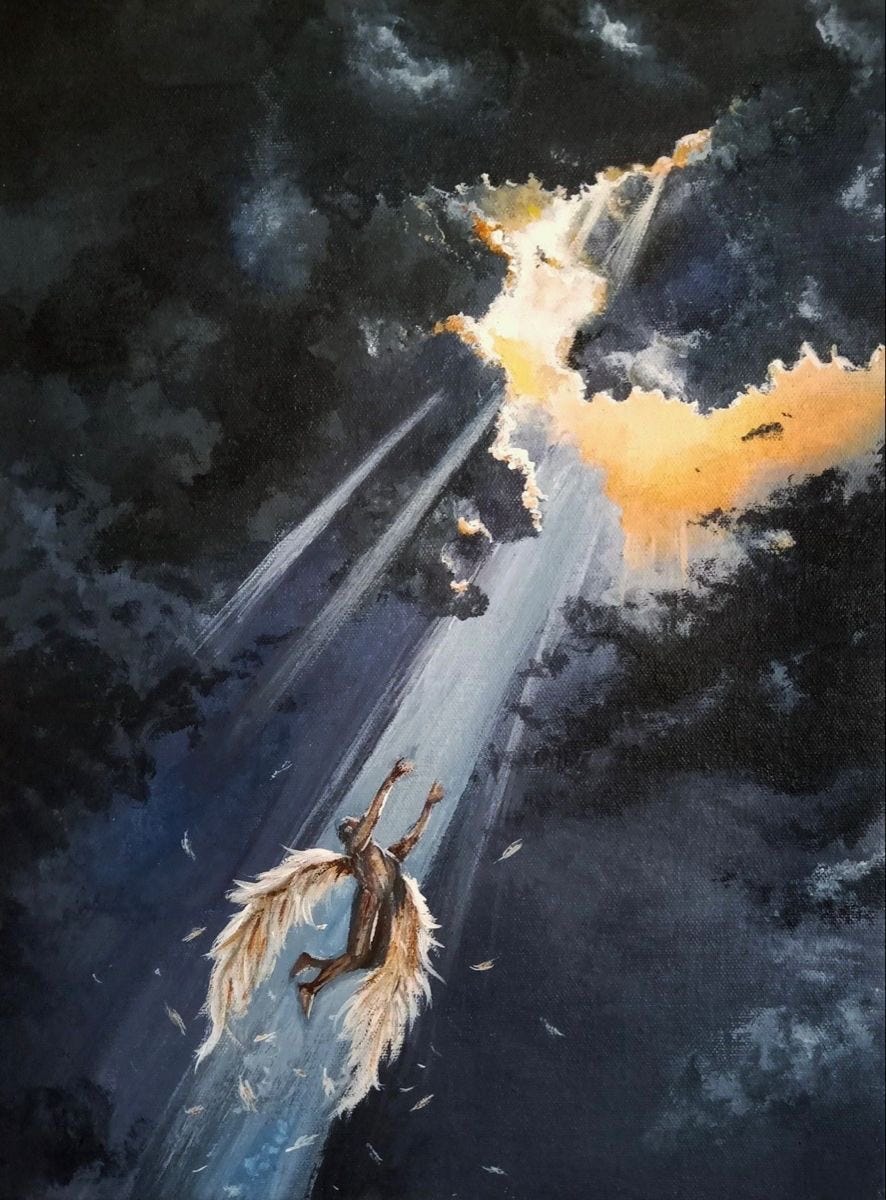in praise of the descent
icarus laughed as he fell, for he knew falling meant he had soared.
the myth of icarus has been passed down as a warning, polished into a neat little fable meant to frighten us into obedience. do not fly too high, they say. do not crave too much. stay within the limits given to you, or you will pay the price. fathers tell it to sons as if ambition is a curse, teachers write it into margins as if desire is a sin. it has become the parable of restraint, a story to keep our eyes lowered and our wings clipped.
but what if the story is not a tragedy at all. what if we have been reading it backwards. what if icarus was not a fool, but the only one brave enough to live.
imagine him in the sky. the air rushing cold against his face, the wings trembling, the wax softening under the sun’s fire. for a brief instant he was not a boy but something more than human. he was hunger embodied, he was daring incarnate, he was freedom in its purest form. when the feathers began to loosen and the sky itself seemed to push him back down, he did not curse the fall. he laughed. he laughed because the fall proved the flight.
to fall means you first left the ground.
icarus becomes a mirror for us, reflecting the restless ache that lives in every human heart. the ache to transcend the small and the certain, to reach beyond the lines drawn for us. the fall is stitched into every act of love, every risk of hope, every dream too large for its container. to love is to invite heartbreak, to hope is to open the door to disappointment, to rise is to accept that you will one day descend. but still, is the fall not worth it. is the fall not proof that we lived at all.
there is a quieter tragedy we rarely name. it is the tragedy of those who never rise. those who choose safety so completely that they never taste the sky. we are taught to fear failure more than we long for freedom. we are told to avoid pain rather than to pursue wonder. but this safety kills in silence. it kills not the body but the spirit. it is the death of risk, the death of joy, the death of everything that makes a life worth living.
icarus knew this. he knew that wings of wax could never last forever. he knew that the price of flight was always descent. and still he soared. his laughter is not foolishness, it is rebellion. it is a hymn against fear, a refusal to let the promise of loss outweigh the taste of glory. it is the sound of a soul that chose the infinite, even if only for a moment.
perhaps that is the real lesson. not that we should avoid the sun, but that we should dare to fly toward it knowing we may fall. dare to love with the full knowledge of loss. dare to hope even when hope makes you vulnerable. dare to live in such a way that your final breath tastes of freedom, not of fear.
because what is the alternative. to keep your feet pressed against the ground, eyes lowered, hands folded, waiting for the years to slip by unnoticed. to die having never risen. that is the tragedy daedalus avoided, but it is also the tragedy icarus refused.
icarus laughed as he fell, and perhaps that is the most human sound of all. laughter in the face of gravity, joy in the grip of impermanence, defiance against the inevitability of death. his laugh carries a philosophy: that meaning is not found in permanence but in intensity. that what matters is not how long we fly, but that we flew at all.
this is what love teaches us. every embrace contains its own ending, every kiss carries the shadow of goodbye. but that does not mean we refuse love. it means we enter it knowing it will change us, knowing it will hurt, knowing it will not last forever, and still we say yes. to love is to soar, and to lose is only to prove that we once touched the sky of another soul.
this is what ambition teaches us. every dream carries the risk of collapse, every pursuit may end in disappointment. but that does not mean we should stop dreaming. the point is not to guarantee success but to live with the fire of striving. the fall is not failure, it is the price of daring.
icarus’s laugh reminds us that there is beauty even in endings. that what is fleeting can be more precious than what endures. permanence breeds numbness. it is the fragile, the temporary, the breakable that makes our lives luminous. wax wings, a burning sun, a brief flight, a burst of laughter. perhaps that is enough.
and so the story of icarus becomes not a warning but an invitation. an invitation to embrace life not as something to be preserved but as something to be spent. to recognize that we are not made for safety but for wonder. to see that death is not the enemy, but the reason that life burns so brightly.
icarus laughed because he had touched the sky. and when the sea rose up to claim him, he sank not as a boy defeated, but as a soul fulfilled.
the tragedy is not in falling. the tragedy is in never having the courage to rise.


